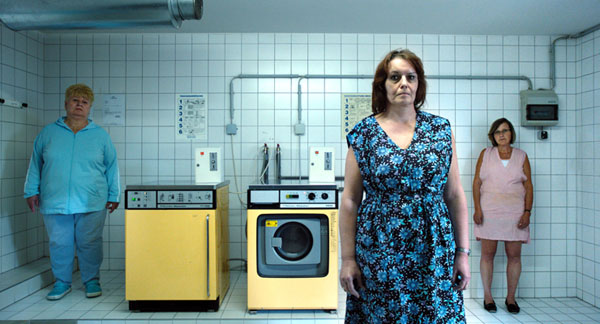“Corpulent sex slaves, tuba-playing Nazi obsessives, reborn doll fantasists—just a regular stroll through the neighborhood, then, for patented guru of the grotesque Ulrich Seidl, who makes an intriguing return to documentary filmmaking with In the Basement,” begins Guy Lodge in Variety. “It’s impossible to read even the barest logline for In the Basement without thinking immediately of Josef Fritzl and Wolfgang Priklopil, whose unrelated but comparable crimes—the horrific confinement, in their respective basements, of young female victims for years on end—prompted even Austria’s political leaders to fear for the country’s international image. Recent Austrian cinema hasn’t done much to soothe the situation, with numerous works (Markus Schleinzer’s Michael most directly of all) dwelling on the social aftermath of the cases, as well as their nation’s much-discussed culture of secrecy.”
“Was the Fritzl case uniquely Austrian, indicative of hypocrisy and brutality under the gemütlich surface, incubated in a spiritually stagnant country which has never cared to examine its past?” asks the Guardian‘s Peter Bradshaw. “Seidl would seem to be the most obvious candidate to address this issue: his documentaries and docu-realist fiction features have examined the bizarre and the grotesque side of bourgeois Austria, finding non-professional actors to inhabit his strange worlds—some of truly Diane-Arbus-type weirdness…. But In the Basement doesn’t really take the Fritzl case head-on and any implied comment is unsatisfactory. It is just another parade of unsettling, shocking and absurd tableaux, of the sort that he has always created, and in many ways tamer than his earlier films.”
“Over the course of his brilliant Paradise Trilogy, Seidl asked us to embrace humanity in all its complex and flawed beauty,” writes Adam Woodward at Little White Lies. “This film takes that intrinsic idealism to a whole new level. We may not always fully understand what we’re seeing, but the deeper into In the Basement we go—the weirder things get—the harder it is to look away.”
You’ll be fine without subtitles
Tom Christie at Thompson on Hollywood: “Among the denizens of Seidl’s deep are an opera-singing gun-slinger; a Hitler-loving history and music buff, a dominatrix-slave couple who raise the level of eww; a woman who was abused by men and now enjoys sex only with men who take absolute charge and inflict pain (though of the ‘good’ sort); a young zaftig woman and her small male friend who wows the ladies, he explains modestly, with his larger than normal, projectically impressive load…. The German-speaking peoples tend to laugh at things other peoples might not find amusing, and that’s the case with this film, the concept of which comes from Seidl’s wife (and fellow director) Veronika Franz, whose Goodnight Mommy is also in the festival. While there’s a certain arthouse appeal to these creepy oddballs, as well as to Seidl’s austere compositions and patient pace, ultimately you feel like you’ve visited a simply strange land—or one of the darker rooms at Berghain—and are happy to go home again.”
For the Hollywood Reporter‘s Deborah Young, after the Paradise Trilogy (Love, Faith and Hope), In the Basement “just feels slighter coming after three watersheds in the director’s career.” Screen‘s Lee Marshall finds it to be “a compellingly weird journey.” Camillo de Marco at Cineuropa: “Though they may resemble freaks to be put on show as if in a 19th-century circus, these people are actually overflowing with a disconcerting but tangible humanity…. They may well provoke feelings of repulsion, but they are our neighbors, and perhaps they are actually us, with our obsessions that we lock away down in the basement. (masalabox.com) ”
Update, 9/4: At the Playlist, Jessica Kiang finds that it’s Seidl’s “rigorous eye for composition and cinematographic portraiture that makes the even the most bizarre images beautiful, and fashions the film, which could feel very fragmented in that it jumps from subject to subject and back again, into a deeply engrossing whole.”
Update, 9/5: “This may be Seidl’s best work,” suggests Nigel Andrews in the Financial Times. “Provocative, funny and shocking: starkly confrontational one moment, mischievously ambivalent the next.”
Update, 9/20: “Two conservative town council members in eastern Austria have resigned from their posts,” reports Reuters. They’re the ones “singing and toasting one another in a basement room filled with Nazi memorabilia. The case has prompted extensive media coverage in Austria.”
Update, 1/11: “Is it any surprise to find deviant sexuality, fascism, xenophobia, obsession, or boredom in basements?” asks Yaron Dahan in the Notebook. “These are, for those willing to admit it, the ‘known secrets’; the ‘normal perversions’ repressed by the societal subconscious rather than an individual one. The real surprise in In the Basement is how the film inverts standard moral values, making the basest perversities seem most normal. The workout machines, the mini swimming pools, the train collections are somehow more perverse than the S&M chambers, the trophy rooms or shooting galleries, whose darkness is at least aware, whereas the former are constructed with the illusory goal of banishing darkness with the insipid.”
Venice 2014 Index. For news and tips throughout the day every day, follow @KeyframeDaily. Get Keyframe Daily in your inbox by signing in at fandor.com/daily.




